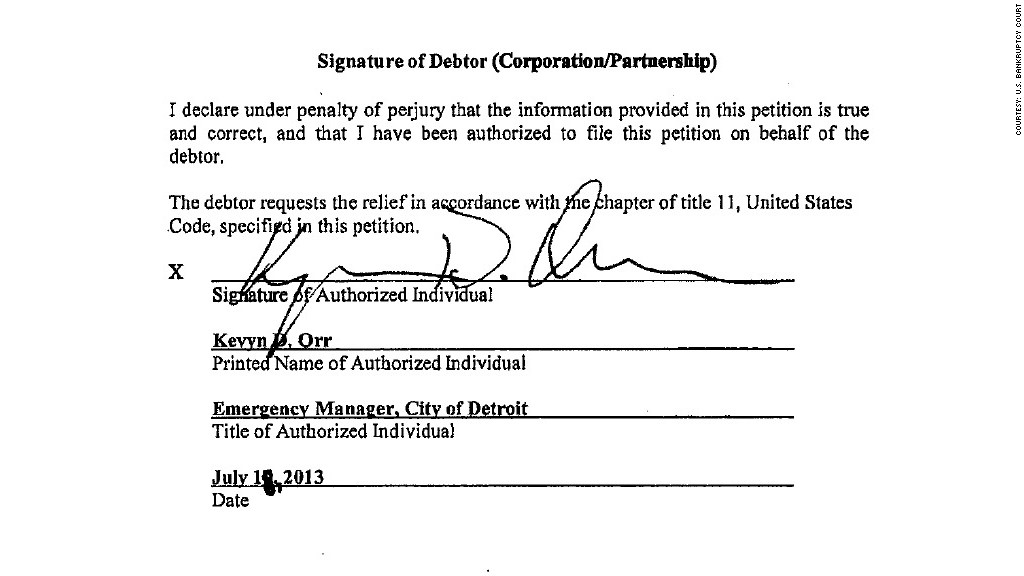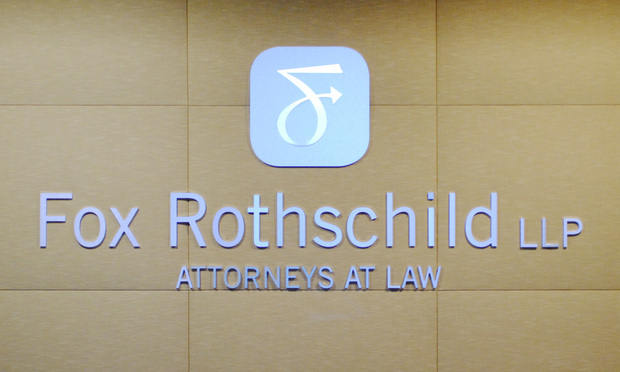 |
| Michael Sweet Fox Rothschild expert on the filing of the Detroit Bankruptcy |
Just as Michael Sweet.
As seen here, Kevyn Orr was "authorized" to file this bankruptcy petition on behalf of the debtor, when the debtor was in state court arguing against it.
Witness the miracle of cell phones.
Detroit bankruptcy filing came with only 5 minutes to spare

Rule 3004. Filing of Claims by Debtor or Trustee
If a creditor does not timely file a proof of claim under Rule 3002(c) or 3003(c), the debtor or trustee may file a proof of the claim within 30 days after the expiration of the time for filing claims prescribed by Rule 3002(c) or 3003(c), whichever is applicable. The clerk shall forthwith give notice of the filing to the creditor, the debtor and the trustee.
Ok, I am just going to ask this only once, because I have been over this a few too many times, but can someone, anyone, tell me how is it that a private individual, who is not elected, represent a State in federal court, when the State Attorney General is representing the State in the State Court of Claims?
The Michigan Emergency Manager does not have any statute "authorizing" representing the State of Michigan in a court of law because that is the job of the State Attorney General.
There is nothing where it says an Emergency Manager can just up and make itself the trustee of a city and represent itself as an individual.
The Act, itself, gives the Emergency Manager, hailing from the executive branch, judicial powers to make judgments.
LOCAL FINANCIAL STABILITY AND CHOICE ACT (EXCERPT)Act 436 of 2012
I am sure there are those wondering, "how the heck does she know all this stuff?"Ok, I am just going to ask this only once, because I have been over this a few too many times, but can someone, anyone, tell me how is it that a private individual, who is not elected, represent a State in federal court, when the State Attorney General is representing the State in the State Court of Claims?
The Michigan Emergency Manager does not have any statute "authorizing" representing the State of Michigan in a court of law because that is the job of the State Attorney General.
There is nothing where it says an Emergency Manager can just up and make itself the trustee of a city and represent itself as an individual.
The Act, itself, gives the Emergency Manager, hailing from the executive branch, judicial powers to make judgments.
Sec. 18.
(1) If, in the judgment of the emergency manager, no reasonable alternative to rectifying the financial emergency of the local government which is in receivership exists, then the emergency manager may recommend to the governor and the state treasurer that the local government be authorized to proceed under chapter 9. If the governor approves of the recommendation, the governor shall inform the state treasurer and the emergency manager in writing of the decision, with a copy to the superintendent of public instruction if the local government is a school district. The governor may place contingencies on a local government in order to proceed under chapter 9. Upon receipt of the written approval, the emergency manager is authorized to proceed under chapter 9. This section empowers the local government for which an emergency manager has been appointed to become a debtor under title 11 of the United States Code, 11 USC 101 to 1532, as required by section 109 of title 11 of the United States Code, 11 USC 109, and empowers the emergency manager to act exclusively on the local government's behalf in any such case under chapter 9.
(2) The recommendation to the governor and the state treasurer under subsection (1) shall include 1 of the following:
(a) A determination by the emergency manager that no feasible financial plan can be adopted that can satisfactorily rectify the financial emergency of the local government in a timely manner.
(b) A determination by the emergency manager that a plan, in effect for at least 180 days, cannot be implemented as written or as it might be amended in a manner that can satisfactorily rectify the financial emergency in a timely manner.
(3) The emergency manager shall provide a copy of the recommendation as provided under subsection (1) to the superintendent of public instruction if the local government is a school district.

Simple. It is nothing but the Michigan Children's Institute law because the Superintendent is the same as the Emergency Manager, except the Emergency Manager law skipped a few steps in due process because it failed recognize a municipality as a public trust and recognized it as a private corporation to initiate seamless asset forfeiture proceedings.
The Children's Trust Funds started here in Michigan and is nothing but the original chattel ponzi scheme, just like they did with the real estate of Detroit, because it all ends up in some form of complex financial fraud scheme as a children's NGO trust.
Honoring Our Past National ... by on Scribd
And to to think, this all started in Detroit.
Anyway, I am quite sure Fox Rothschild has alot more of these ponzi schemes using trust funds, but hey, what do I know?
Fox Rothschild Headed to New Jersey Supreme Court in Case Stemming From Ponzi Scheme
The high court's review follows an appeals court ruling that revived a claim from a U.K. real estate investor alleging Fox Rothschild improperly let $2.4 million flow through an attorney trust account to a fraudster.
The New Jersey Supreme Court will review a London-based real estate investor’s lawsuit accusing Fox Rothschild of improperly transferring $2.4 million from the firm’s attorney trust account to now-convicted Ponzi schemer Eliyahu Weinstein.
With a notice handed down Nov. 16 and made public Monday, New Jersey’s high court agreed to consider whether U.K. real estate investor Moshe Meisels can maintain his claims of conversion and breach of fiduciary duty against Fox Rothschild. Meisels alleged that he was bilked by Weinstein—who previously pleaded guilty to running a yearslong, real estate Ponzi scheme that caused $200 million in losses—and that more than $2.4 million he lost moved through Fox Rothschild’s attorney trust account.
The state high court’s review comes after an intermediate appeals court in June revivedMeisels’ conversion claim against the law firm, while it also kept intact a trial court’s dismissal of the fiduciary breach claims.
Meisels alleged that he and Weinstein reached an agreement to invest in property in Irvington, New Jersey. In connection with that deal, Weinstein in 2007 directed Meisels to transfer a portion of the investment into Fox Rothschild’s attorney trust account, according to court documents. Weinstein, who was later sentenced to 22 years in prison for his Ponzi scheme, told Meisels at the time that Fox Rothschild was carrying out legal work on the property purchase.
Meisels transferred the money, and it later went into the coffers of some of Weinstein’s businesses, with $75,000 of it going to Fox Rothschild. The money was never used to purchase any property and, in his suit against the firm, Meisels alleged that Fox Rothschild effectively aided Weinstein as he carried out his fraud.
Lawyers from Fox Rothschild attacked Meisels’ claims on several fronts, ultimately convincing a trial court to dismiss them in a summary judgment ruling. Among other arguments, Fox Rothschild said Meisels couldn’t pursue his conversion claim because he didn’t do enough to show that he actually owned the money he allegedly lost, and because he never demanded its return.
Meisels countered that, while the transfers to the attorney trust account technically came from a company called Rightmatch Ltd., the business was serving merely as a conduit for the London-based Meisels to help convert his own personal funds from the British pound to U.S. dollars.
In June, the Superior Court of New Jersey, Appellate Division found against the law firm on both of those arguments. The appeals court held that Meisels had done enough to prove it was his money that flowed through the firm’s trust account. The court also noted that under the facts of this particular case, Meisels wasn’t required to demand his money back to be able to claim conversion in court.
The appeals court did, however, come down on Fox Rothschild’s side with respect to Meisels’ breach of fiduciary duty claim. The appellate ruling affirmed the trial court’s conclusion that Fox Rothschild didn’t owe any fiduciary duty to Meisels, leaving that claim dismissed.
Fox Rothschild’s defense lawyer, Francis Devine III of Pepper Hamilton, did not immediately respond to a request for comment, nor did a lawyer for Meisels, Brian Condon of Condon Catina & Mara in Nanuet, New York.
Read More:
Voting is beautiful, be beautiful ~ vote.©

3 comments:
https://www.rightmatch.co.in/
https://opencorporates.com/companies/gb/04114908
https://cruxnow.com/vatican/2020/06/vatican-arrests-businessman-in-shady-london-real-estate-deal/
Post a Comment